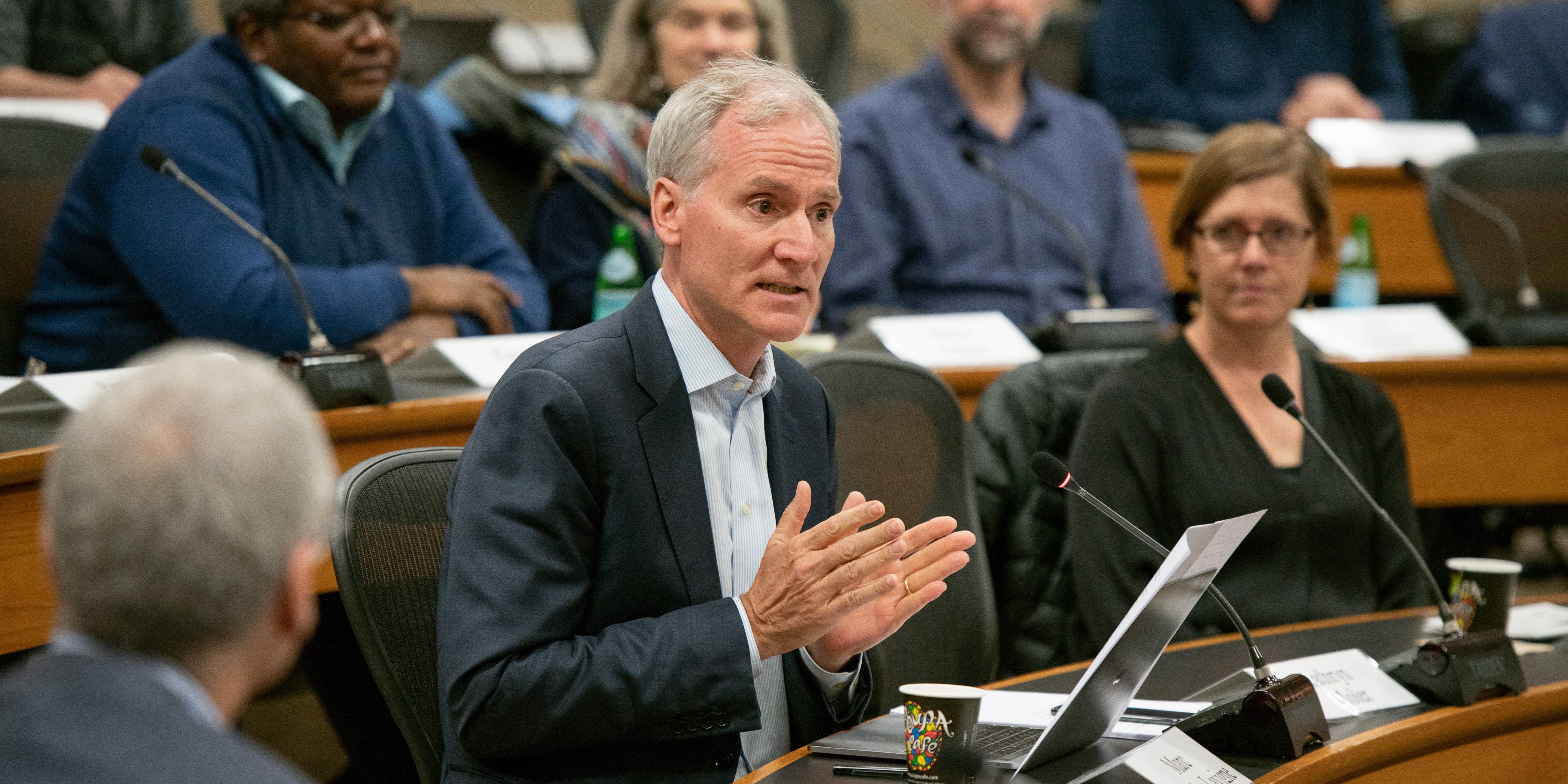At the Faculty Senate’s first meeting of spring quarter, University President Marc Tessier-Lavigne addressed the circumstances surrounding the expulsion of a student involved in the admissions bribery scandal. The Senate also further addressed University policies regarding admissions, broadening opportunities for students with financial need and updates to interdisciplinary study programs.
Admissions scandal update
Tessier-Lavigne announced to the Senate that a student implicated in the admissions bribery scandal who was admitted with falsified sailing credentials had been expelled.
The former head sailing coach John Vandemoer has previously pled guilty to accepting financial contributions to the sailing program in exchange for providing an athletic recommendation for two students, though neither of the two students ended up attending Stanford.
A third student was implicated as a result of investigating another donation from the same foundation, Tessier-Lavigne said. While the donation occurred several months after the student was admitted, and she did not receive a recommendation from the sailing coach, the student’s application was found to have “falsified information.” The admission of this student has since been rescinded.
Tessier-Lavigne called the situation “completely appalling,” adding that it is “antithetical” to the values of the university and its standards of ethical conduct.
“I can’t say that forcefully enough,” he said.
Tessier-Lavigne outlined a number of steps that the University has taken in response, including the provision of recommendations and an external review of the athletic department regarding its recruitment process and acceptance of gifts. The credentials of all current members of the sailing team have been confirmed, as well as those of all other student-athletes in this year’s application pool.
In addition, there is now a permanent second-level review put in place regarding the acceptance of student-athletes to guard against such scenarios in the future, according to Tessier-Lavigne. An investigation is currently underway in cooperation with government authorities regarding the appropriate way to direct the funds associated with the fraudulent activity.
Broadening opportunities
Provost Persis Drell added that a broader issue nationally and in the Stanford community is “what this admissions fraud scheme says about how the privileged seek access to higher education.”
Stanford’s newly admitted Class of 2023 represents high regional and ethnic diversity, Drell said, including students from 50 states and 84 countries. Eighteen percent of the new admits are the first in their family to attend college.
Drell noted the efforts of Stanford to “broaden opportunities” and increase emphasis on access to higher education, including the decision to not publicly announce the number of applicants in this year’s pool. According to Drell, selectivity and low admissions rates distort what the college admission process should be, and “that is not a race we want to be a part of.”
“It’s really important for us and for the public to know that we are trying to be an engine of opportunity,” Drell said. “There may be ways we can do that better, but it is something we are conscious of and working on.”
To this end, Drell reported that two-thirds of Stanford undergraduates receive financial aid, and that over 80 percent graduate with no student debt.
Dean of the College of Humanities and Sciences Debra Satz added that the de-funding of public higher education is “part of the context in which [Stanford is] being held under the microscope … I would love to see Stanford step up as a leader, fighting both for the importance of public education and also standing up against the defunding of humanities and arts.”
Interdisciplinary programs
The Senate also discussed high student participation in interdisciplinary degree programs and the review process of these programs.
French and Italian associate professor Laura Wittman joined Tim Stearns, who is the Frank Lee and Carol Hall Professor of Genetics, in presenting a report on the duties of the Committee on Review of Undergraduate Majors (C-RUM). Stearns serves as the Chair Emeritus of C-RUM.
Wittman emphasized the role of the committee in reviewing interdisciplinary programs. Students in interdisciplinary programs comprise 22 percent of declared majors and 12 percent of all undergraduates, according to the report.
Members of the Senate then remarked on the status of and resources available to these programs. Specifically, Symbolic Systems program director and philosophy professor Kenneth Taylor said that interdisciplinary programs are “kind of [like] stepchildren … the ones that get all the goodies are the [academic] departments, and then we have to go say, ‘Can we go to the ball too?’”
Jeffrey Koseff M.S. ’78, Ph.D. ’83, founding co-director of the Stanford Woods Institute for the Environment, said that in addition to connecting the different departments, interdisciplinary programs have the potential to collaborate with University centers and institutes.
“There is this connection already,” Koseff said. “If it were formalized I think that it would flourish.”
The Senate discussed current efforts to review requirements for departmental majors, including a long-range planning committee dedicated to investigating the wide variation in degree requirements across departments. Review of degree programs has been conducted in the past and is being reinstituted in degree programs in the College of Humanities and Sciences, according to Satz.
The next Faculty Senate meeting will be held on April 25.
Contact Elise Miller at elisejl ‘at’ stanford.edu.
